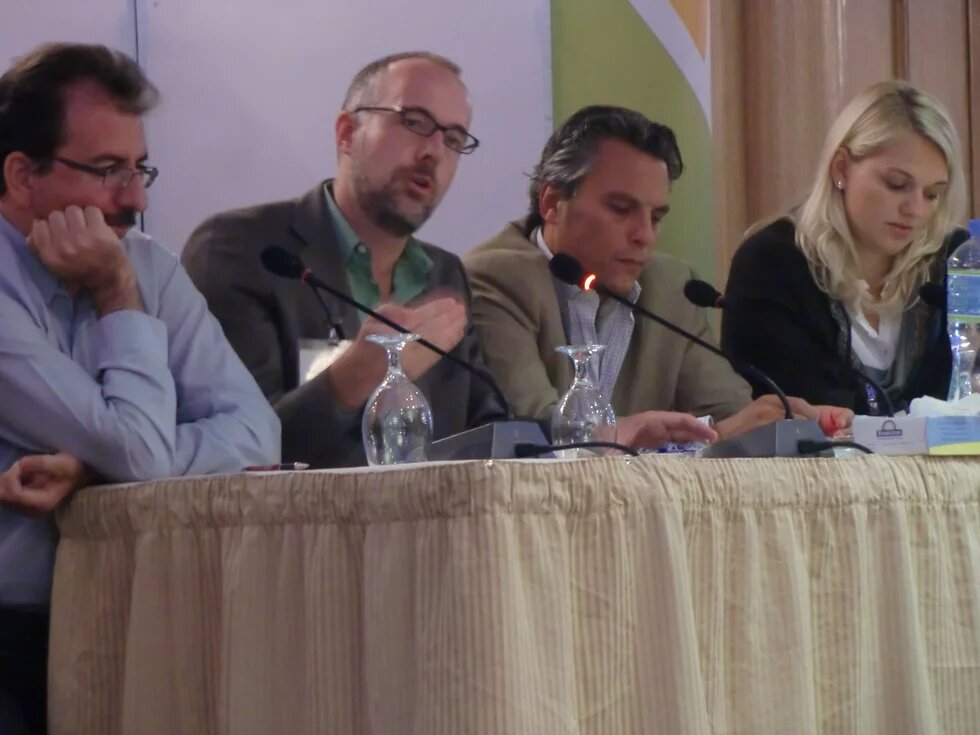
Arne Jungjohann is the Director for the Environment and Global Dialogue Programme of the Washington office. Previous to his work with HBS, he worked as a senior advisor for the German Green Party. In his presentation, Arne provided some background about the German decision to fade out of nuclear energy and go renewable. By doing that, he explains, Germany has created more than 380.000 jobs, built up a world leading green technology sector, and has reduced the dependency on fossil fuel imports. Today renewable energy (25%) provides more electricity than nuclear power (18%). “On sunny and windy days, half the country is powered by renewable energies,” Arne emphasized.
Dr. Riyad Hodali, who holds a Ph.D. in Renewable Energy and Energy Efficiency, provided background information about the Palestinian Solar Initiative as well as the importance of feed-in tariffs for the success of renewable energy initiatives. The PSSES is a non-governmental organisation trying to promote renewable energy in Palestine through projects on different levels, such as education, policy development, and research. Among their previous projects is the installation of solar-run streetlights for parts of Wad El Nar, a very dangerous road which connects Hebron to Bethlehem. PSSES also cooperated with the Indian Barefoot College by selecting three senior illiterate women to participate in a six month-training in India. Using only colours and manual techniques as a teaching tool, they learn how to install, maintain and repair solar panels and provide for lighting in their villages.
Mohammad Qaraqa gave input on the restrictions and hindrances faced by renewable energy projects in the context of the Israeli occupation, and provided an overview over the general situation of electrical energy in the oPt. ARIJ has been working for more than 20 years in the fields of economical and social development, and natural resource management in the occupied Palestinian territory. ARIJ is currently conducting a project for poverty reduction through green energy, in the course of which they will provide 18 rural poor families in the Bethlehem governorate with no current access to affordable energy with home based off-grid solar panels system.
Just one day later, on 25th September, HBS brought the German Energy Transition to Jordan through a workshop on “The German Energy Transition - How Does It Work and What Does It Mean for Jordan?” in Amman. With the great support of EDAMA Association , HBS was glad to welcome Anna Leidreiter of the World Future Council, Batir Wardam, a renowned environmental researcher, and Raouf Dabbas of Friends of the Environment Jordan, in addition to Arne Jungjohann who travelled to Amman with us.
Anna Leidreiter is the Policy Officer in the Climate and Energy Department for the World Future Council. Anna focused in her presentation on international reactions to the German transition and on successful implementation strategies. According to her, the German Feed-in tariff policy became a blueprint for more than 80 countries and states worldwide. The right regulatory framework can trigger investments and result in enormous social-economic development, in which feed-in tariffs play a crucial role. The WFC aims at bringing the interests of future generations to the centre of policy making. It addresses challenges and provides decision-makers with effective policy solutions. In-depth research underpins the council’s advocacy work for international agreements, regional policy frameworks and national lawmaking and thus produces practical and tangible results.
Batir Wardam is a Jordanian environmentalist with professional experience in disciplines of natural resource management, environmental policies and communication. He has a 15 years working experience in national academic institutions, NGOs, the government of Jordan and international and regional environmental organizations including UNDP and IUCN. In his presentation, he stressed that as Jordan imports 98% of its energy needs, energy security is a key issue. Focusing on renewable energy would mean a shift towards using domestic energy sources. As Arne Jungjohann pointed out: because of the climatic conditions, a solar panel in Jordan could produce twice the electricity than in Germany. According to Batir, the German case example has been widely used in the Jordanian debate. Its applicability has been used to back up the arguments of pro-renewable activists and researchers and thus strengthened their stand.
Raouf Dabbas is a former senior advisor at the Jordanian Ministry of Environment, and founding member of several NGOs. As the president of the NGO the Friends of Environment Society for ten years, he has vast experience as an environmental lobbyist and activist. He gave an overview over the current status of energy consumption in Jordan, and pointed out the potential for renewables in the country. He emphasised that a policy framework, based on clear guidelines and incentives, is crucial for the development of a thriving renewable energy sector.
As different as the two events were – a rather small, informal round table discussion in Ramallah, and a bigger, more formal workshop in Amman – both had in common the obvious wish and need for discussion. And as Anna Leidreiter points out , the underlying factors of the German transition are often overlooked. “The secret to why an industrialized country with a huge energy demand can phase out nuclear power and rely on renewable energies in times of financial crisis is simple: by taking a decentralized approach and engaging a critical mass of citizens the energy transition results in regional value creation and therefore in socio-economic benefits across the country. In Germany there are 800 energy cooperatives that are the driver of the energy transition. FiTs are evidently acting as a connecting policy – linking people, policy, energy and economy.”
For more pictures of the events, please visit our facebook page !
Please find the power point presentations online:
- Mr. Arne Jungjohann presentation
- Ms. Anna Leidreiter presentation
- Mr. Batir Wardam presentation
- Mr. Raouf Dabbas presentation
Pictures of the event in Amman are also provided on EDAMA’s facebook page